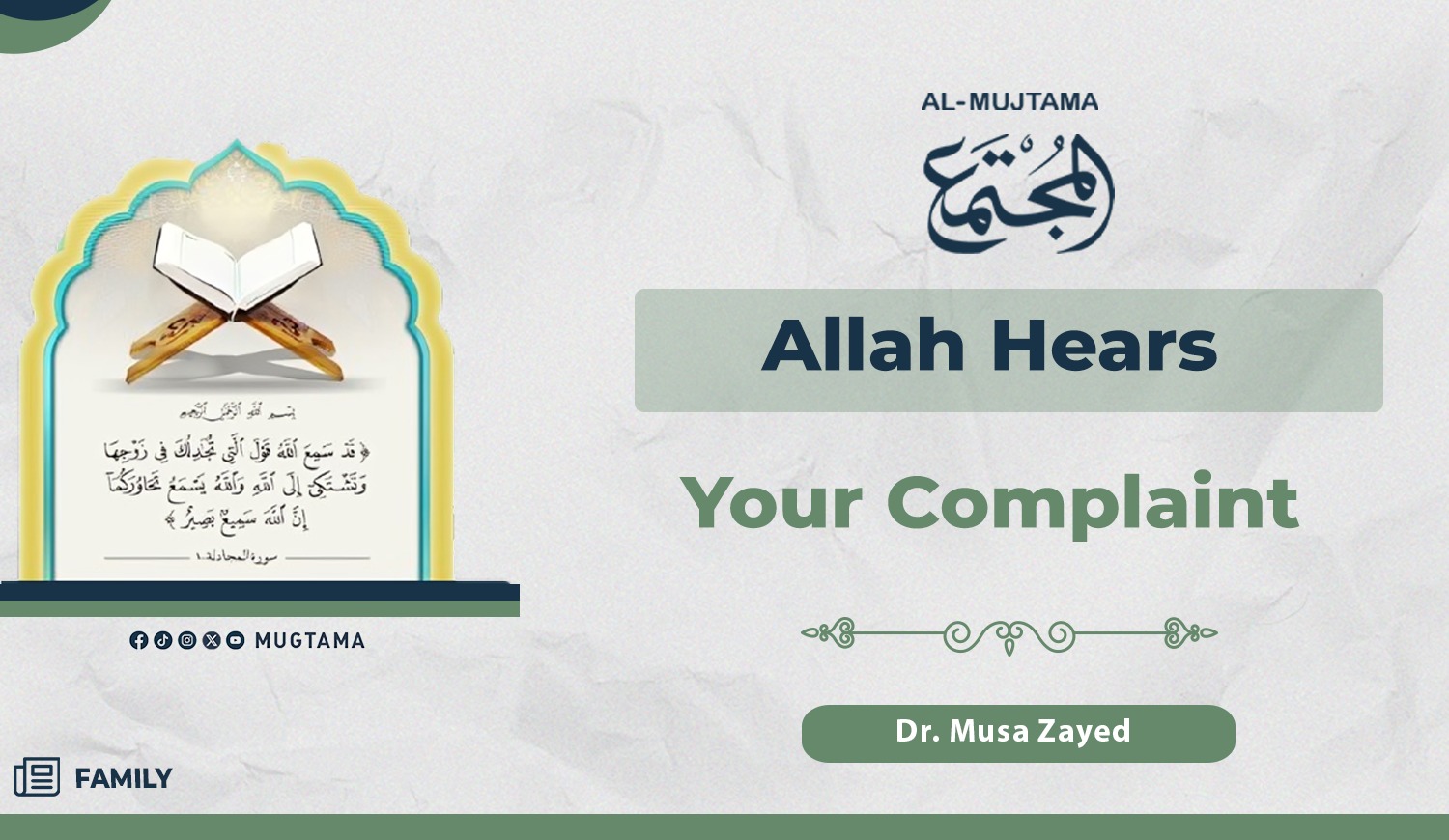Allah Hears Your Complaint

This is part of the ayah from Surat al-Mujadilah, the opening ayahs of which were
revealed concerning a family dispute in one of the noble households of the
Companions, between Khawlah bint Tha‘labah and her husband Aws ibn al-Ṣamit (may Allah be pleased with them both).
Aws, in a moment of intense anger, said to her: “You are to me as the back
of my mother.” This was an oath used in the Jahiliyyah (pre-Islamic era),
and by it, a man would prohibit his wife upon himself without divorcing
her—leaving her in a state where she could neither be with him nor marry
another. This was one of the injustices to which women were subjected during Jahiliyyah.
Khawlah went to the Prophet ﷺ to complain that her husband had declared dhihar against her, after she had
given him the best years of her youth. At that time, there was no legislation
concerning such a matter yet.
The Prophet ﷺ attempted to calm her and advised her
regarding her husband, who was also her cousin. But the woman felt a lump in
her throat and expressed her suffering openly, and while she was still in the
room of ʿA’ishah (may Allah be pleased with
her), without having left her place, these ayah were revealed: “Certainly has Allah heard
the speech of the one who argues with you, [O Muhammad], concerning her husband
and directs her complaint to Allah. And Allah hears your dialogue; indeed,
Allah is Hearing and Seeing. Those who pronounce dhihar among you [to separate]
from their wives - they are not [consequently] their mothers. Their mothers are
none but those who gave birth to them. And indeed, they are saying an
objectionable statement and a falsehood. But indeed, Allah is Pardoning and
Forgiving. And those who pronounce dhihar from their wives and then [wish to]
go back on what they said - then [there must be] the freeing of a slave before
they touch one another. That is what you are admonished thereby; and Allah is
Acquainted with what you do. And he who does not find [a slave] - then a fast
for two months consecutively before they touch one another; and he who is
unable - then the feeding of sixty poor persons. That is for you to believe
[completely] in Allah and His Messenger; and those are the limits [set by]
Allah. And for the disbelievers is a painful punishment.” (Al-Mujadilah: 1–4)
From the ayah of Surat al-Mujadilah,
we learn:
That Allah the Exalted prioritized
this matter, which concerns family and its cohesion, over other important
issues addressed later in the surah, such as the topic of loyalty to the
believers and disassociation from the polytheists and hypocrites, as well as
the etiquettes of gatherings, giving space therein, and the etiquettes of
private conversations. Indeed, this story was used as an entry point to speak
about faith in Allah’s watchfulness, His encompassing knowledge, and His
recording of all that His servants say and do.
Thus, the ayahs point to the
importance of family cohesion, which is founded upon fairness, justice, and the
prompt resolution of problems before they worsen.
They also show that a Muslim must
return to Islam in all of his affairs and in solving all his problems, just as
the woman turned to the Prophet ﷺ.
Perhaps this very issue is one of
the reasons for the current weakness of Muslims: that they seek solutions to
their problems in imported systems that have created these very problems—just
as the Jahiliyyah started the issue of dhihar.
The ayahs also indicate the
divine presence and that Allah is aware of what a person conceals in intention
or reveals in action.
The beginning of the ayahs with “Certainly has Allah heard” implies both certainty
and confirmation, as well as a response and acknowledgment of the injustice
that befell the woman and it gives her glad tidings of the resolution to her
problem before even announcing the solution. This is similar to when a Muslim,
upon rising from rukuʿ, says: “Samiʿa Allahu
liman ḥamidah” (Allah
hears the one who praises Him). The matter here is greater than mere hearing, which
is already affirmed, it is a form of divine honoring of those who praise Him,
valuing what they do.
Among what the ayahs point to is
what Islam has planted in the hearts of its followers: not accepting oppression
even from the closest of people, seeking justice, and preserving human dignity.
In a single ayah, Allah combined
the past tense verb (Certainly has Allah heard),
which denotes emphasis and certainty, and the present tense verb, which denotes
the present and future (and Allah hears),
along with the two Names of Allah: The Hearing and The Seeing: “Indeed, Allah is Hearing and Seeing.” Notably,
the Divine Name appears powerfully in all three instances: “Certainly has Allah heard,” “and Allah hears,” “Indeed,
Allah is Hearing and Seeing.”
The ayah indicate that Islam is a
comprehensive system and complete legislation. It establishes the model society
built upon a loving, cohesive family.
-------------------------------------------------------------










